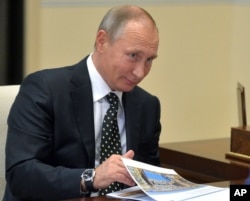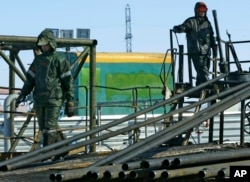Russian prosecutors charged Economic Development Minister Alexei Ulyukayev with extortion Tuesday and requested he be placed under house arrest in the highest-level corruption case of its kind in decades. Ulyukayev’s lawyer said he denies the charges.
Analysts and observers question the charges as politically motivated and say the arrest of Ulyukayev more likely exposes an internal Kremlin battle between those for and against more state control of the dwindling Russian economy.
Ulyukayev was detained late Monday after a sting operation carried out by Russia’s Federal Security Services (FSB), according to Russia’s Investigative Committee (SK).
The SK claims Ulyukayev received $2 million he demanded from state oil company Rosneft in return for a positive assessment from his ministry on a controversial October deal that saw Rosneft purchase a 50 percent government stake in another government-owned oil company, Bashneft.
Prosecutors allege Ulyukayev threatened to obstruct the acquisition if the bribe was not paid.
Fight against corruption?
Russian state media declared it the first arrest of a sitting minister in President Vladimir Putin’s fight against corruption.
The speaker of Russia’s lower house of parliament, Vyacheslav Volodin, said the prosecution of Ulyukayev shows there are “no untouchables in Russia” and that “everyone is equal under the law,” reported Russia’s Tass state news agency.
The government was selling a 50.1 percent share of Bashneft as part of a privatization drive that has supporters and detractors. A number of officials and economists, including Ulyukayev, criticized the participation of state-run Rosneft in the bidding.
Rosneft head Igor Sechin, a close friend and ally of Putin, had been pushing for the deal, which would consolidate more of Russia’s oil industry under his control. Putin eventually supported Rosneft’s $5 billion bid for the government’s stake in Bashneft.
Analysts poured doubt on the possibility that Ulyukayev or anyone else would demand a bribe from a company controlled by such a powerful and well-connected person as Sechin, let alone make threats.
Ulyukayev fell victim to the escalating political struggle inside the ruling class, says Vasily Koltashov, head of the Center of Economic Research at the Institute of Globalization and Social Movements. “The law enforcement bodies do not act without a command.”
Rosneft officially cleared
Kremlin spokesman Dmitry Peskov told state media Putin was informed about the investigation of Ulyukayev from the beginning and noted the charges were “very serious” and would require “very serious evidence.”
Peskov said there was no connection between Ulyukayev’s case and the legality of the Bashneft purchase, echoing Russia’s Investigative Committee, which declared the Rosneft-Bashneft deal was "completed on legal grounds.”
Alexei Portansky, a senior research fellow at the Russian Academy of Sciences' Institute of the World Economy and International Relations, called Ulyukayev's arrest a "very painful blow" to the government's economic policy-making team.
Liberals vs. State control
Kremlin watchers say with Russia’s economy contracting as a result of low oil prices, Western sanctions, and lack of diversification, a struggle has erupted among the elites for control of key assets.
Russia’s Vedomosti newspaper in September cited Federal Antimonopoly Service statistics showing state-controlled companies dramatically increased their share in Russia's GDP, from 35 percent in 2005 to 70 percent by 2015.
Russian authorities in 2014 seized control of Bashneft from oligarch owner Vladimir Yevtushenkov, who was charged with money-laundering and acquiring the company illegally, charges that were later dropped.
Critics called it an asset-grab by the state and reminiscent of the government’s seizure of Yukos Oil Company from Kremlin critic Mikhail Khodorkovsky in 2003. Most of the broken-up Yukos entities ended up controlled by Rosneft and Gazprom, Russia's state-controlled natural gas monopoly.
Russian Prime Minister Dmitry Medvedev, who had originally opposed the Rosneft-Bashneft deal until Putin spoke in favor of it, discussed Ulyukayev’s case with the president and called for a thorough investigation.
Former Russian Finance Minister Alexei Kudrin, an advocate of economic reforms, said the accusations against Ulyukayev raise lots of questions. He called for an objective investigation.






